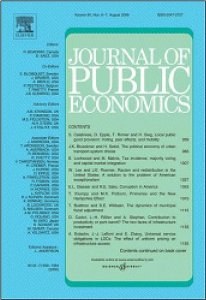
Bovenberg, A. and Jacobs, B. (2005). Redistribution and education subsidies are Siamese twins Journal of Public Economics, 89(11-12):2005--2035.
-
Affiliated author
-
Publication year2005
-
JournalJournal of Public Economics
We develop models of optimal linear and non-linear income taxation with endogenous human capital formation to explore optimal education subsidies. Optimal subsidies on education ensure efficiency in human capital accumulation and thus play an important role in alleviating the tax distortions on learning induced by redistributive policies. If the government cannot verify all investments in human capital, education policy offsets some but not all tax-induced distortions on learning. Non-pecuniary educational costs (benefits) may increase (decrease) subsidies on education, especially if they are complementary to work effort. {\textcopyright} 2005 Elsevier B.V. All rights reserved.